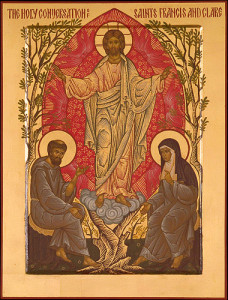PEACE and good to each of you. As we begin this month of celebration with the Feast of Our Lady of the Angels of the Portiucula, we are reminded of the Portiuncula Indulgence, the first written document of which was dated October 31, 1277. The Portiuncula was the place where St. Clare received her religious habit at the hands of St. Francis in 1211. In a vision in 1216, St. Francis obtained from Our Lord the indulgence of the Pardon of Assisi which was approved by Pope Honoroius, III. We are the beneficiaries of this plenary indulgence which is a mighty tool for works of mercy and a weapon in our ongoing spiritual warfare. To obtain the Portiuncula plenary indulgence, a person must visit the Chapel of Our Lady of the Angels at Assisi (would that we could), or a Franciscan sanctuary, or one’s parish church, with the intention of honoring Our Lady of the Angels. One should then perform recite the Creed, an Our Father and pray for the intentions of our Holy Father, Pope Francis. One should be free, at least intentionally, of attachment to venial and mortal sin, and truly repentant. One should make your sacramental confession 8 days before or after the feast and participate at Mass and receive Holy Communion 8 days before or after the feast.
Last month we began an article written by Sr. Clare Andre in honor of St. Clare. As the Feast of St. Clare occurs this month, the conclusion of the article follows.
May the dear Lord bless and keep each of you close to His Sacred heart.
Rosie
Clare was a woman of prayer, and her entire life was lived in trust of the God whom she knew loved her. She needed little material wealth because she trusted that God would care for all her physical needs. God never let her down. It takes deep faith to live so, but anyone who has tried to live dependent on God learns quickly the joy of simplicity.
Clutter blocks freedom and blurs perception. Living simply helps one develop an attitude or willingness to be emptied. One quickly learns what is important. Those who live simply learn to live with open hands: to appreciate what is given but to be equally willing to let go, when letting go is what is needed.
Contemplative living was Clare’s reason for living simply. One needs to be poor to have the space to meet God. Clare, by her way of life, witnessed to others the one thing necessary and found herself united with all people in sharing her need for and reliance on God.
The most genuine poverty seems to come from within. Individuals in poverty make families and communities poor. Life’s biggest challenge seems to be embracing inner poverty. It takes real honesty to face oneself, to acknowledge clinging to possessions and to admit attraction to power and privilege, tendencies we all share.
Courage is needed to be poor, to recognize the need for conversion and not to be overwhelmed by it. Embracing inner poverty can turn lives upside down. In facing the struggle, though, we—like Clare—can recognize that areas of weakness are also areas of grace.
Our own struggle with sinfulness teaches patience and forgiveness as we encounter the mistakes and failures of others. Conversion is the only route to transformation. Poverty frees and enables Christians to face the cross. In experiencing the cross, we—like Clare—are transformed.
Clare, in a letter to Ermentrude of Bruges (a Flemish founder trying to live in the spirit of Clare and her followers), tells us: “Love God and Jesus, who was crucified for us, from the depth of your heart, and never let the thought of Him leave your mind. Meditate constantly on the mysteries of the cross. Do not be afraid, my daughters. God, who is faithful in all His works and holy in all His deeds, will pour out His blessings upon you. God will be your helper and best consoler. God is our redeemer and our eternal reward.”
Suffering is a part of life. No one can escape suffering, but how it’s understood informs and influences how one handles it. Clare focused her daughters on Christ crucified. She prayed before the crucified Jesus and contemplated the Gospel accounts of the Passion.
At first glance, this can seem like an unhealthy stress on pain or a glorification of suffering. That was not Clare’s intention. Clare knew that staying with Jesus in the Passion accounts would move her beyond suffering to a deep realization of Jesus’ love. Recognizing such love creates a burning desire to be one with the crucified. In short, there is no embracing the cross that does not lead to at least hints of resurrection!
St. Clare was no victim-martyr. She did not go out searching for suffering. She was, however, open to facing the suffering that came her way. She knew grace would be present and that this grace would give her the strength and courage she needed. It would also give her the vision to see beyond herself and grasp the insights that only God could teach.
Clare learned that embracing the cross opens one totally to God, who keeps teaching the depths of love. This union with God unites neighbors. Our suffering becomes one with that of others. Together, we learn the compassion and love mirrored by Jesus.
Clare wrote four letters to Agnes of Prague, the queen of Bohemia, who became a Poor Clare. (Clare’s sister Agnes is known as Agnes of Assisi.) In her third letter to Agnes, she writes, “The soul of a faithful person is greater than heaven itself, since the heavens and the rest of creation can not contain the creator and only the faithful soul is God’s dwelling place and throne. As the glorious Virgin of Virgins carried Jesus materially, so we too, by following in her footprints, especially those of poverty and humility, can without a doubt, always carry Him spiritually in our chaste and virginal bodies, holding the one by whom all things are held together, possessing that which in comparison with the other transitory possessions of the world, we will possess more securely.”
Taking these words to Agnes seriously would change the way people look at themselves and others. The answer lies within. The realization of this “indwelling of God” calls for a respect and an appreciation for who we are. Clare taught her sisters to see themselves as temples of God, mirrors of Christ and revelations of the Holy Spirit. Such servanthood holds none of the unhealthy implications of being either slaves or doormats.
It calls us to mirror the self-emptying compassion we have seen mirrored in Jesus. It is the same Jesus, as we clearly know, who dwells in our neighbor. Our neighbors are also temples of God, mirrors of Christ and revelations of the Spirit. Our God dwells in each of us and each of us uniquely manifests our God.
Like Mary, we are called to birth our God for one another, to bring to life the reality of God’s presence.
Service goes beyond merely doing for one another. Service, in Clare’s view, is a calling to be reflections of God for one another. Within each of us, Clare saw clearly, is a seed that awaits birth. We are encouraged to endure life’s labor pangs and bring forth life. Not to do so would be to have the manifestation of God be stillborn.
This is the vision that Clare held with Francis, one that they both gleaned from the gospel. It is a vision of light embraced by Poor Clares, but one that can illuminate the Church at large in this new century.
At first glance, this can seem like an unhealthy stress on pain or a glorification of suffering. That was not Clare’s intention. Clare knew that staying with Jesus in the Passion accounts would move her beyond suffering to a deep realization of Jesus’ love. Recognizing such love creates a burning desire to be one with the crucified. In short, there is no embracing the cross that does not lead to at least hints of resurrection!
St. Clare was no victim-martyr. She did not go out searching for suffering. She was, however, open to facing the suffering that came her way. She knew grace would be present and that this grace would give her the strength and courage she needed. It would also give her the vision to see beyond herself and grasp the insights that only God could teach.
Clare learned that embracing the cross opens one totally to God, who keeps teaching the depths of love. This union with God unites neighbors. Our suffering becomes one with that of others. Together, we learn the compassion and love mirrored by Jesus.
Clare wrote four letters to Agnes of Prague, the queen of Bohemia, who became a Poor Clare. (Clare’s sister Agnes is known as Agnes of Assisi.) In her third letter to Agnes, she writes, “The soul of a faithful person is greater than heaven itself, since the heavens and the rest of creation can not contain the creator and only the faithful soul is God’s dwelling place and throne. As the glorious Virgin of Virgins carried Jesus materially, so we too, by following in her footprints, especially those of poverty and humility, can without a doubt, always carry Him spiritually in our chaste and virginal bodies, holding the one by whom all things are held together, possessing that which in comparison with the other transitory possessions of the world, we will possess more securely.”
Taking these words to Agnes seriously would change the way people look at themselves and others. The answer lies within. The realization of this “indwelling of God” calls for a respect and an appreciation for who we are. Clare taught her sisters to see themselves as temples of God, mirrors of Christ and revelations of the Holy Spirit. Such servanthood holds none of the unhealthy implications of being either slaves or doormats.
It calls us to mirror the self-emptying compassion we have seen mirrored in Jesus. It is the same Jesus, as we clearly know, who dwells in our neighbor. Our neighbors are also temples of God, mirrors of Christ and revelations of the Spirit. Our God dwells in each of us and each of us uniquely manifests our God.
Like Mary, we are called to birth our God for one another, to bring to life the reality of God’s presence.
Service goes beyond merely doing for one another. Service, in Clare’s view, is a calling to be reflections of God for one another. Within each of us, Clare saw clearly, is a seed that awaits birth. We are encouraged to endure life’s labor pangs and bring forth life. Not to do so would be to have the manifestation of God be stillborn.
This is the vision that Clare held with Francis, one that they both gleaned from the gospel. It is a vision of light embraced by Poor Clares, but one that can illuminate the Church at large in this new century.




